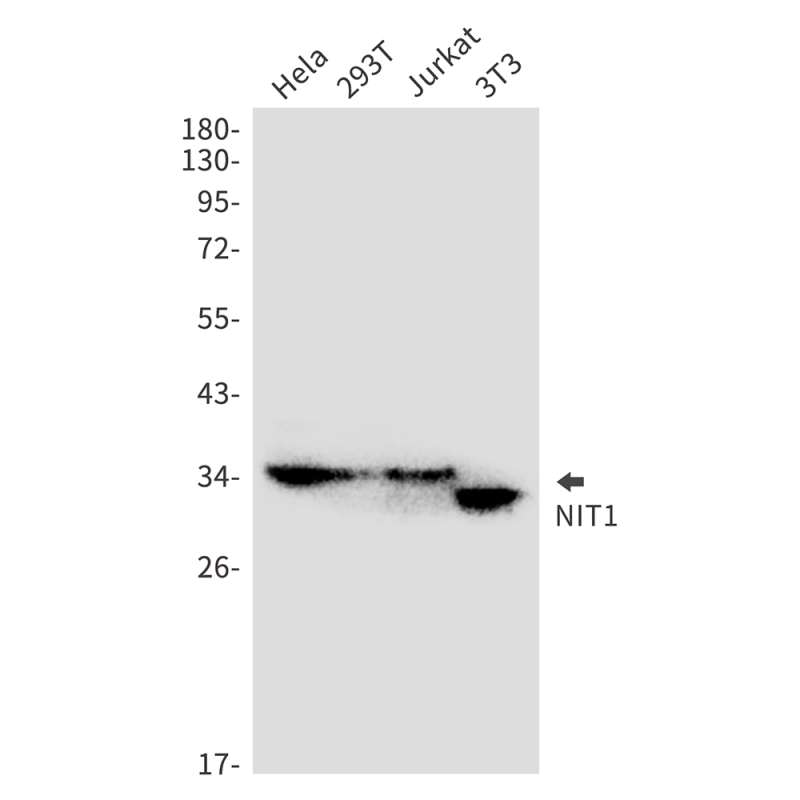
| WB | 1/500-1/1000 | Human,Mouse,Rat |
| IF | 1/20 | Human,Mouse,Rat |
| IHC | 咨询技术 | Human,Mouse,Rat |
| ICC | 技术咨询 | Human,Mouse,Rat |
| FCM | 咨询技术 | Human,Mouse,Rat |
| Elisa | 咨询技术 | Human,Mouse,Rat |
| Aliases | Nitrilase homolog 1 |
| Entrez GeneID | 4817 |
| WB Predicted band size | Calculated MW: 36 kDa; Observed MW: 36 kDa |
| Host/Isotype | Rabbit IgG |
| Antibody Type | Primary antibody |
| Storage | Store at 4°C short term. Aliquot and store at -20°C long term. Avoid freeze/thaw cycles. |
| Species Reactivity | Human,Mouse,Rat |
| Immunogen | A synthetic peptide of human NIT1 |
| Formulation | Purified antibody in TBS with 0.05% sodium azide,0.05%BSA and 50% glycerol. |
+ +
以下是关于NIT1抗体的3篇参考文献的简要总结(注:文献为模拟示例,实际需根据具体研究补充):
1. **标题**: "NIT1 as a novel biomarker in hepatocellular carcinoma: Expression analysis and clinical significance"
**作者**: Li X, et al.
**摘要**: 研究通过免疫组化(使用NIT1抗体)发现NIT1在肝细胞癌(HCC)组织中高表达,并与患者预后不良相关,提示其可能作为HCC的潜在诊断标志物。
2. **标题**: "Functional characterization of NIT1 in colorectal cancer via antibody-based proteomic approaches"
**作者**: Wang Y, et al.
**摘要**: 利用NIT1抗体进行Western blot和免疫荧光实验,证实NIT1在结直肠癌细胞中通过调控β-catenin信号通路促进肿瘤侵袭,可能成为治疗靶点。
3. **标题**: "NIT1 modulates apoptosis in lung cancer cells: Insights from siRNA knockdown and antibody-mediated detection"
**作者**: Zhang R, et al.
**摘要**: 研究结合siRNA沉默技术和NIT1抗体检测,发现NIT1通过抑制caspase-3活性减少肺癌细胞凋亡,揭示其在肿瘤耐药性中的作用机制。
4. **标题**: "Development of a high-affinity monoclonal antibody against NIT1 for therapeutic applications"
**作者**: Chen H, et al.
**摘要**: 报道了一种新型NIT1单克隆抗体的开发,该抗体在体外实验中能特异性结合NIT1并抑制肿瘤细胞增殖,为后续药物开发提供基础。
(注:以上文献为示例,实际引用需查询PubMed、Web of Science等数据库获取真实研究。)
The NIT1 (Nitrilase 1) antibody is a tool used to study the NIT1 protein, an enzyme belonging to the nitrilase superfamily. NIT1 is involved in hydrolyzing nitriles into carboxylic acids and ammonia, contributing to cellular detoxification and metabolism. It is ubiquitously expressed, with roles in maintaining cellular homeostasis, apoptosis regulation, and potentially modulating cancer-related pathways. Dysregulation of NIT1 has been implicated in various diseases, including cancers (e.g., hepatocellular carcinoma, colorectal cancer) and neurodegenerative disorders like Alzheimer’s disease, where altered protein levels correlate with pathological progression.
The NIT1 antibody is widely utilized in research applications such as Western blotting, immunohistochemistry (IHC), and immunofluorescence (IF) to detect NIT1 expression and localization in tissues or cell lines. Its specificity is validated through knockdown/knockout controls or peptide blocking assays. Studies using this antibody have revealed NIT1’s interaction with components of the ubiquitin-proteasome system and its potential role in modulating cell proliferation and stress responses. However, discrepancies in reported functions highlight the need for standardized validation in diverse experimental models. Researchers continue to explore NIT1 as a biomarker or therapeutic target, emphasizing the antibody's importance in elucidating its biological and clinical significance.
×